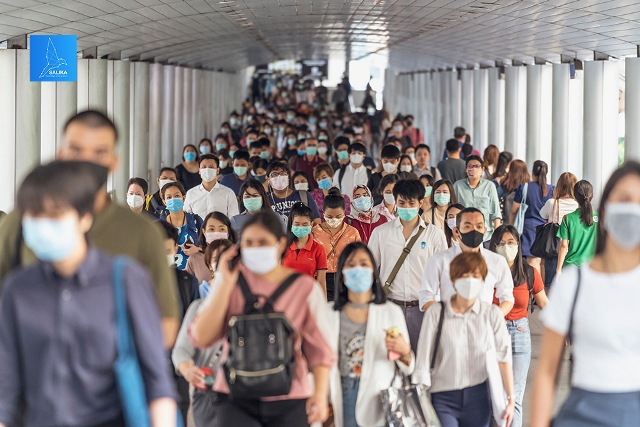โควิด-19 ทำโลกถึงจุดเปลี่ยน ผลสำรวจบ่งชี้ งานประเภทเข้า 9 โมงเช้า เลิก 5 โมงเย็น สัปดาห์ละ 5 วันอาจไม่มีอีกต่อไป จุดเริ่มต้นวัฒนธรรมทำงานรูปแบบใหม่
โควิด-19 ทำโลกถึงจุดเปลี่ยน ผลสำรวจบ่งชี้ งานประเภทเข้า 9 โมงเช้า เลิก 5 โมงเย็น สัปดาห์ละ 5 วันอาจไม่มีอีกต่อไป จุดเริ่มต้นวัฒนธรรมทำงานรูปแบบใหม่
เว็บไซต์สุขภาพ ข่าวสาธารณสุข ท่องเที่ยว เศรษฐกิจ - โลกถึงจุดเปลี่ยน ! ผลสำรวจบ่งชี้ งานประเภทเข้า 9 โมงเช้า เลิก 5 โมงเย็น สัปดาห์ละ 5 วันอาจไม่มีอีกต่อไป วัฒนธรรมการทำงานรูปแบบใหม่ถือกำเนิดขึ้น
 กรุงเทพฯ--6 กันยายน 2563—พีอาร์นิวส์ไวร์ / อินโฟเควสท์ ซิกน่า อินเตอร์เนชันแนล มาร์เกตส์ ในเครือบริษัทซิกน่า ( NYSE : CI )
กรุงเทพฯ--6 กันยายน 2563—พีอาร์นิวส์ไวร์ / อินโฟเควสท์ ซิกน่า อินเตอร์เนชันแนล มาร์เกตส์ ในเครือบริษัทซิกน่า ( NYSE : CI )
เผยแพร่ข้อมูลใหม่ล่าสุดจากการศึกษาผลกระทบทั่วโลกจากโควิด-19 หรือ Cigna COVID-19 Global Impact Study
ซึ่งตอกย้ำว่าวัฒนธรรมการทำงานอาจเปลี่ยนไปอย่างถาวรเนื่องจากโควิด
News Update วันอาทิตย์ที่ 6 กันยายน 2563 - ข่าวล่าสุดวันนี้ : งานวิจัยล่าสุดของซิกน่าซึ่งจัดทำขึ้นในเดือนมิถุนายน เป็นการติดตามสุขภาพและความเป็นอยู่ของผู้คนทั่วโลกช่วงเกิดการระบาดใหญ่
ซึ่งพบว่าผู้ตอบแบบสำรวจทั่วโลก 18% รู้สึกว่าชีวิตจะไม่เหมือนเดิมอีกต่อไป เพิ่มขึ้น 5% จากการสำรวจเมื่อเดือนเมษายน
โดยตัวเลขดังกล่าวในเกาหลี สิงคโปร์ และสหรัฐอเมริกา เพิ่มขึ้นเป็น 38%, 26% และ 25% ตามลำดับ
 อย่างไรก็ตาม เว็บไซต์ medhubnews.com ข่าวสังคม สุขภาพ ท่องเที่ยว วาไรตี้ และ เพจ sasook ทวิตเตอร์ @medhub_news รายงานว่า มีผู้ตอบแบบสำรวจในจีนแผ่นดินใหญ่เพียง 5% เท่านั้นที่คิดเช่นนี้
อย่างไรก็ตาม เว็บไซต์ medhubnews.com ข่าวสังคม สุขภาพ ท่องเที่ยว วาไรตี้ และ เพจ sasook ทวิตเตอร์ @medhub_news รายงานว่า มีผู้ตอบแบบสำรวจในจีนแผ่นดินใหญ่เพียง 5% เท่านั้นที่คิดเช่นนี้
งานวิจัยดังกล่าววัดระดับความเป็นอยู่ด้วยปัจจัยชี้วัดหลัก ได้แก่ ปัจจัยทางกายภาพ สังคม การเงิน ครอบครัว และการทำงาน, คะแนนสุขภาพและความเป็นอยู่, การติดตามประเมินสุขภาพเสมือนจริง และการแสดงความคิดเห็นเกี่ยวกับชีวิตวิถีใหม่
งานประเภทเข้า 9 โมงเช้า เลิก 5 โมงเย็น สัปดาห์ละ 5 วันอาจไม่มีอีกต่อไป
 ผู้ตอบแบบสำรวจ 60% สามารถทำงานจากที่บ้านได้ในขณะนี้ ซึ่งส่งผลกระทบอย่างมากต่อทัศนคติของผู้คนที่มีต่อวัฒนธรรมการทำงานในอนาคต
ผู้ตอบแบบสำรวจ 60% สามารถทำงานจากที่บ้านได้ในขณะนี้ ซึ่งส่งผลกระทบอย่างมากต่อทัศนคติของผู้คนที่มีต่อวัฒนธรรมการทำงานในอนาคต
ผู้ตอบแบบสำรวจมากกว่าครึ่ง (53%) ระบุว่า ในอนาคต พวกเขาต้องการทำงานจากที่บ้านอย่างน้อยครึ่งหนึ่งของเวลางาน โดยตัวเลขดังกล่าวเพิ่มขึ้นแตะ 67% ในสิงคโปร์, 56% ในสเปนและไทย และ 40% ในเกาหลี
ขณะเดียวกัน ผู้ตอบแบบสำรวจเกือบหนึ่งในสี่ (22%) ต้องการมากกว่านั้น โดยระบุว่าต้องการทำงานในออฟฟิศไม่เกิน 20% ของเวลางาน
ผลสำรวจเผยให้เห็นว่า ความต้องการทำงานที่ออฟฟิศเต็มเวลาอยู่ในระดับต่ำมากในขณะนี้ โดยมีผู้ตอบแบบสำรวจไม่ถึงหนึ่งในสี่ (23%)
ที่ต้องการกลับไปทำงานที่ออฟฟิศเต็มเวลา ซึ่งความต้องการดังกล่าวมีระดับต่ำสุดในสิงคโปร์และไทย (17%) และจีนแผ่นดินใหญ่ (19%)
 เจสัน แซดเลอร์ ประธานซิกน่า อินเตอร์เนชันแนล มาร์เกตส์ กล่าวว่า "การระบาดใหญ่ส่งผลกระทบต่อชีวิตการทำงานและชีวิตส่วนตัวของเราอย่างมาก
เจสัน แซดเลอร์ ประธานซิกน่า อินเตอร์เนชันแนล มาร์เกตส์ กล่าวว่า "การระบาดใหญ่ส่งผลกระทบต่อชีวิตการทำงานและชีวิตส่วนตัวของเราอย่างมาก
แม้ว่าออฟฟิศยังคงมีบทบาทสำคัญในแง่ของการสร้างวัฒนธรรมองค์กรและการทำงานร่วมกัน แต่ประสบการณ์ในช่วงไม่กี่เดือนที่ผ่านมาแสดงให้เห็นว่า การทำงานที่บ้านก็มีประสิทธิภาพสูงเช่นกัน
อย่างไรก็ตาม การทำงานที่บ้านมีความท้าทายหลายอย่าง และนายจ้างต้องคิดให้รอบคอบว่าจะสนับสนุนพนักงานที่ทำงานจากระยะไกลอย่างไร ด้วยการเช็กกับพนักงานเป็นประจำ"
ผู้คนกลัวติดเชื้อจึงเลี่ยงการทำงานในออฟฟิศและการเดินทางในชีวิตประจำวัน
การที่หลายบริษัทเริ่มกลับมาทำงานที่ออฟฟิศได้สร้างความวิตกกังวลครั้งใหม่ในหมู่พนักงาน โดยผู้ตอบแบบสำรวจ 42% รู้สึกกังวลว่าจะติดเชื้อโควิดจากการเดินทาง การประชุมต่อหน้า หรือการอยู่ในออฟฟิศร่วมกัน
ความกังวลนี้เพิ่มขึ้นสู่ระดับ 54% ในสิงคโปร์ และ 51% ในสหรัฐอาหรับเอมิเรตส์ แต่ลดลงเหลือเพียง 19% ในฮ่องกง อย่างไรก็ตาม ฮ่องกงมีผู้ติดเชื้อเพิ่มขึ้นหลังทำการสำรวจเสร็จสิ้นไปแล้ว
นอกจากนี้ ผู้ตอบแบบสำรวจ 41% รู้สึกกังวลเกี่ยวกับมาตรการป้องกันในที่ทำงาน เช่น การเว้นระยะห่างทางสังคม
และการสวมหน้ากากอนามัย โดยผู้ตอบแบบสำรวจในไทยและสิงคโปร์กังวลมากที่สุด (47%) ขณะที่ผู้ตอบแบบสำรวจในนิวซีแลนด์มีความกังวลน้อยที่สุด (26%)
ความต้องการของพนักงานไม่ได้รับการเติมเต็มอย่างเพียงพอ
ผลสำรวจตอกย้ำว่า พนักงานต้องการความช่วยเหลือแตกต่างกันเมื่อต้องกลับไปทำงานที่ออฟฟิศ ขณะเดียวกัน ความช่วยเหลือที่นายจ้างให้กับพนักงานในตอนนี้ก็แตกต่างกัน
นายจ้างส่วนใหญ่แสดงความรับผิดชอบอย่างจริงจัง โดยผู้ตอบแบบสำรวจมากกว่าครึ่ง (52%) ระบุว่า นายจ้างมีการจัดหาผลิตภัณฑ์ป้องกันและฆ่าเชื้อให้พนักงาน
เช่น หน้ากากอนามัยและเจลล้างมือ ซึ่งตัวเลขดังกล่าวเพิ่มขึ้นแตะ 62% ในจีนแผ่นดินใหญ่, 58% ในไต้หวัน และ 55% ในสิงคโปร์และนิวซีแลนด์
อย่างไรก็ตาม ผู้ตอบแบบสำรวจ 60% ระบุว่า ต้องการให้นายจ้างช่วยออกค่าใช้จ่ายพิเศษ เช่น ค่าผลิตภัณฑ์ป้องกันและฆ่าเชื้อ รวมถึงค่าสาธารณูปโภคจากการทำงานที่บ้าน
โดยตัวเลขดังกล่าวเพิ่มขึ้นสู่ระดับ 73% และ 71% ในสหรัฐอาหรับเอมิเรตส์และสิงคโปร์ ซึ่งมีการใช้เครื่องปรับอากาศมาก ในทางตรงกันข้าม ผู้ตอบแบบสำรวจราวหนึ่งในห้า (19%)
ระบุว่านายจ้างมีมาตรการที่เหมาะสมอยู่แล้ว โดยนายจ้าง 29% ในสหรัฐอาหรับเอมิเรตส์, 18% ในสิงคโปร์ และ 11% ในฮ่องกง ให้ความช่วยเหลือพนักงานในส่วนนี้
 นอกจากนี้ การส่งเสริมสุขภาพจิตก็เป็นอีกสิ่งหนึ่งที่พนักงานต้องการ แม้ว่าผู้ตอบแบบสำรวจเกือบหนึ่งในสี่ (24%) ระบุว่านายจ้างส่งเสริมสุขภาพจิตอยู่ในขณะนี้
นอกจากนี้ การส่งเสริมสุขภาพจิตก็เป็นอีกสิ่งหนึ่งที่พนักงานต้องการ แม้ว่าผู้ตอบแบบสำรวจเกือบหนึ่งในสี่ (24%) ระบุว่านายจ้างส่งเสริมสุขภาพจิตอยู่ในขณะนี้
แต่ 50% ต้องการมากกว่านั้น โดยนายจ้างในนิวซีแลนด์ (40%) และสหรัฐอาหรับเอมิเรตส์ (34%) เป็นผู้นำในการส่งเสริมสุขภาพจิต เทียบกับนายจ้างเพียง 15% ในเกาหลี และ 16% ในฮ่องกง
คุณแซดเลอร์ กล่าวเสริมว่า "ขณะที่ตลาดทยอยเปิดและพนักงานเริ่มกลับเข้าออฟฟิศ ผลสำรวจของเราแสดงให้เห็นว่ามีช่องว่างขนาดใหญ่ระหว่างความคาดหวังกับความเป็นจริง
และพนักงานคาดหวังให้นายจ้างอุดช่องว่างดังกล่าวด้วยการให้ความช่วยเหลือในสิ่งที่จำเป็นอย่างเพียงพอ และเดินหน้าสร้างวัฒนธรรมการทำงานที่ต่างฝ่ายต่างสนับสนุนกัน
ในขณะที่เราเปลี่ยนผ่านไปสู่ชีวิตวิถีใหม่ สิ่งสำคัญไม่ใช่แค่การตรวจเช็กกันและกันเท่านั้น แต่นายจ้างยังต้องยกระดับความเป็นอยู่ของพนักงานอย่างครอบคลุม โดยเน้นไปที่การลดและจัดการความเครียดและความวิตกกังวลของพนักงาน"
ซิกน่า นำเสนอข้อมูลด้านสุขภาพและความเป็นอยู่ที่หลากหลาย เพื่อช่วยให้นายจ้างและพนักงานสามารถตรวจเช็กและสนับสนุนซึ่งกันและกันอย่างมีประสิทธิภาพ
เช่น คำแนะนำจากผู้เชี่ยวชาญด้านการเงิน ทรัพยากรบุคคล และสุขภาพจิต รวมถึงแนวคิดสร้างสรรค์ในการติดต่อกับเพื่อนร่วมงาน ครอบครัว และเพื่อนฝูง
ตลอดจนแหล่งข้อมูลจากผู้เชี่ยวชาญที่จะช่วยให้คุณสามารถวางแผนจัดการความเครียดของตนเอง โดยนายจ้างสามารถดูข้อมูลได้ ที่นี่ และพนักงานสามารถดูข้อมูลได้ ที่นี่
นอกจากนั้นยังมีหลากหลายแนวทางส่งเสริมสุขภาพจิตฟรีบน เว็บไซต์ของซิกน่า
วิธีการศึกษา
การศึกษาผลกระทบทั่วโลกจากโควิด-19 เป็นการศึกษาต่อเนื่องซึ่งจัดทำโดยซิกน่าร่วมกับกันตาร์ ในระหว่างเดือนมกราคม-มิถุนายน 2563 และจะดำเนินต่อไปตลอดปี
โดยนับตั้งแต่เริ่มโครงการจนถึงขณะนี้ มีการสำรวจออนไลน์ทั้งหมด 16,843 ครั้งในจีนแผ่นดินใหญ่ ฮ่องกง เกาหลี นิวซีแลนด์ สิงคโปร์ สเปน ไต้หวัน ไทย สหรัฐอาหรับเอมิเรตส์ สหราชอาณาจักร และสหรัฐอเมริกา
การศึกษานี้ดำเนินการโดยใช้แบบสำรวจออนไลน์ โดยผู้ตอบแบบสำรวจได้รับการคัดเลือกจากคณะกรรมการออนไลน์และมีการควบคุมคุณภาพอย่างเข้มงวด
นอกจากนั้นยังมีการกำหนดโควต้าอายุ เพศ และเมืองที่อาศัยตามสัดส่วนประชากรของแต่ละประเทศและดินแดน การตอบแบบสำรวจใช้เวลา 20-25 นาทีโดยไม่ต้องระบุตัวตน
 New Work Culture Emerges as World Transitions New Findings Reveal That the 9-5, Five Day Week is Unlikely to Return
New Work Culture Emerges as World Transitions New Findings Reveal That the 9-5, Five Day Week is Unlikely to Return
HONG KONG--Sept. 6, 2020--PRNewswire/InfoQuest Cigna's (NYSE:CI) International Markets business has published new figures from its Cigna COVID-19 Global Impact Study, which highlight that working cultures could permanently change due to the pandemic.
According to Cigna's latest research, carried out in June as part of the Cigna COVID-19 Global Impact Study which is tracking people's health and well-being around the world throughout the pandemic, 18% of people across the world feel that life will never be the same again, an increase of 5% since April.
In Korea, Singapore and the United States, this rose to 38%, 26% and 25% respectively.
However, Mainland China remained more confident that the status quo would continue, with only 5% saying the same.
The report measures well-being across key indicators, including physical, social, financial, family and work; the health and wellness scorecard; the virtual health assessment tracker; and opinions on what the new normal will look like.
The 9-5, Five Day Week May be Dead
Currently, 60% of people across the surveyed markets are able to work from home, which has had a major impact on people's attitudes to work culture in the future.
Over half of people (53%) now say they would like to work from home at least half the time in the future, this rose to 67% of people in Singapore, and 56% in Spain and Thailand, as well as 40% of people in Korea.
Nearly a quarter (22%) went further, saying they wanted to work from an office no more than 20% of the time.
The appetite for full time office based working is now very low. Less than a quarter of people (23%) want to return to the office full time, with the lowest demand seen in Singapore and Thailand (17%), and Mainland China (19%).
Jason Sadler, President, Cigna International Markets said, "The pandemic has dramatically impacted our working and personal lives. While the office still has a role in terms of building culture and collaboration, the experience of the last few months has demonstrated that home based working can also be highly effective.
However, this also brings challenges and employers need to think carefully about how they can support their staff who are working remotely, by checking in with them regularly."
Worries about infection put people off offices and the daily commute
The prospect of a return to physical workplaces is creating new anxieties among employees, 42% said they were concerned about catching the coronavirus because of travel, in-person meetings or common working spaces.
This rose to 54% in Singapore and 51% in the UAE, but fell to only 19% in Hong Kong, which saw an increase in cases after this latest survey was completed.
41% said they were concerned about workplace protocols, such as social distancing and the need to wear a face mask, with people in Thailand and Singapore the most worried (47%) and New Zealand, perhaps understandably, least worried at 26%.
Not all employee needs being filled adequately
The report also highlighted the different kinds of support employees would prefer as they return to the workplace, as well as the gap in terms of what support employers are currently offering.
Most employers appear to be taking their responsibilities seriously.
Over half (52%) said their employers offer protective and sanitising products, such as facemasks and santiser.
This increases to 62% in Mainland China, 58% in Taiwan and 55% in Singapore and New Zealand.
However, 60% of people said they would like subsidies on extra expenses, such as protective and sanitising products, utility bills from working from home, rising to 73% and 71% in air-conditioning reliant UAE and Singapore.
Despite this, approximately one in five (19%) said that their employer already had suitable measures in place, although 29% of UAE and 18% of Singapore employers have stepped up to offer this support, compared to only 11% in Hong Kong.
Mental health support was another area that was identified. Although nearly a quarter (24%) said their employers currently offer support, 50% said they would like more.
New Zealand (40%) and UAE (34%) employers have led the way with the provision of mental health support, compared to only 15% of Korean and 16% of Hong Kong firms.
Sadler added, "With some markets gradually opening and people returning to the workplace, our findings show that there is still a large gap between expectations and reality.
Employees will look to organizations to narrow this gap by providing adequate support where needed and continue building a workplace culture centred around mutual support.
As we transition to a new normal, it is key for us to not only continue checking in with one another but also for employers to develop comprehensive well-being programs focused on equipping employees with tools to reduce and manage their stress and anxiety levels."
Cigna offers a range of health and well-being resources to help employers and employees to check-in and support each other in an effective way.
This includes advice from financial, HR and mental health experts, creative ideas for staying connected with colleagues, family and friends, and specialist resources to help you create your own stress care plan.
These are available here for employers and here for employees. In addition, a wide range of free online mental health support resources are available on Cigna's website
How the study was conducted:
The Cigna COVID-19 Global Impact Study is an ongoing study that has been conducted by Cigna, in partnership with Kantar, between January and June 2020, and will continue for the remainder of the year.
To date, a total of 16,843 online interviews have been conducted across Mainland China, Hong Kong, Korea, New Zealand, Singapore, Spain, Taiwan, Thailand, United Arab Emirates, United Kingdom and United States.
The study was conducted using an online survey, with respondents recruited from online panels and undergo rigorous quality control.
Age, gender and residing city quotas were set based on the population proportion of respective markets. The 20 to 25 minutes survey was completed anonymously.
Cigna%20COVID-19%20Global%20Impact%20Study.jpg)
06 กันยายน 2563
ผู้ชม 1114 ครั้ง


